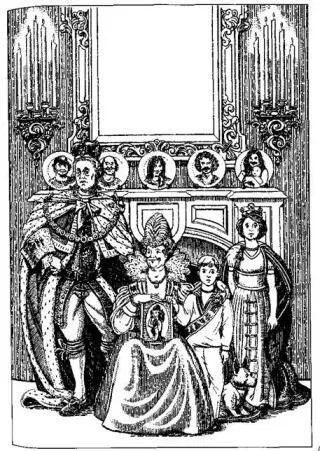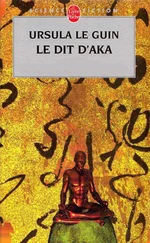It is a small plane, and nearly everybody on it is related. As it is a monarchy, or rather a congeries of monarchies, this means that almost everybody is, or descended from, a monarch. Everybody is a member of the Royal Family.
In earlier times this universality of aristocracy caused trouble and dissension. Rival claimants to the crown tried to eliminate each other; there was a long period of violence referred to as the Purification of the Peerage, a war called the Agnate War, and the brief, bloody Cross-Cousins’ Revolt. But all these family quarrels were settled when the genealogies of ever)’ lineage and individual were established and recorded in the great work of the reign of Eduber XII of Sparg, the Book of the Blood.
Now 488 years old, this book is, I may say without exaggeration, the centerpiece of every Hegnish household. Indeed it is the only book anybody ever reads. Most people know the sections dealing with their own family by heart. Publication of the annual Addition and Supplements to the Book of the Blood is awaited as the great event of the year. It furnishes the staple of conversation for months, as people discuss the sad extinction of the Levigian House with the death of old Prince Levigvig; the exciting possibility of an heir to the Swads arising from the eminently suitable marriage of Endol IV and the Duchess of Mabuber; the unexpected succession of Viscount Lagn to the crown of East Fob due to the untimely deaths of his great-uncle, his uncle, and his cousin all in the same year; or the relegitimi-sation (by decree of the Board of Editors-Royal) of the great-grandson of the Bastard of Egmorg.
There are 817 kings in Hegn. Each has title to certain lands, or palaces, or at least parts of palaces; but actual rule or dominion over a region isn’t what makes a king a king. What matters is having the crown and wearing it on certain occasions, such as the coronation of another king, and having one’s lineage recorded unquestionably in the Book of the Blood, and edging the sod at the first game of the local sutpot season, and being present at the annual Blessing of the Fish, and knowing that one’s wife is the queen and one’s eldest son is the crown prince and one’s brother is the prince royal and one’s sister is the princess royal and all one’s relations and all their children are of the blood royal.
To maintain an aristocracy it is necessary that persons of exalted rank form intimate association only with others of their kind. Fortunately there are plenty of those. Just as the bloodline of a Thoroughbred horse on my plane can be tracked straight back to the Godolphin Arabian, every royal family of Hegn can trace its descendance from Rugland of Hegn-Glander, who ruled eight centuries ago. The horses don’t care, but their owners do, and so do the kings and the royal families. In this sense, Hegn may be seen as a vast stud farm.
There is an unspoken consensus that certain royal houses are slightly, as it were, more royal than others, because they descend directly from Rugland’s eldest son rather than one of his eight younger sons; but all the other royal houses have married into the central line often enough to establish an unshakable connection. Each house also has some unique, incomparable claim to distinction, such as descent from Alfign the Ax, the semilegendary conqueror of North Hegn, or a collateral saint, or a family tree never sullied by marriage with a mere duke or duchess but exhibiting (on the ever-open page of the Book of the Blood in the palace library) a continuous and unadulterated flowering of true blue princes and princesses.
And so, when the novelty of the annual Addition and Supplements at last wears thin, the royal guests at the royal parties can always fall back on discussing degrees of consanguinity, settling such questions as whether the son born of Agnin IV’s second marriage, to Tivand of Shut, was or was not the same prince who was slain at the age of thirteen defending his father’s palace against the Anti-Agnates and therefore could, or could not, have been the father of the Duke of Vigrign, later King of Shut.

Such questions are not of interest to everyone, and the placid fanaticism with which the Hegnish pursue them bores or offends many visitors to their plane. The fact that the Hegnish have absolutely no interest in any people except themselves can also cause offense, or even rage. Foreigners exist. That is all the Hegnish know about them, and all they care to know. They are too polite to say that it is a pity that foreigners exist, but if they had to think about it, they would think so.
They do not, however, have to think about foreigners. That is taken care of for them. The Interplanary Hotel on Hegn is in Hemgogn, a beautiful little kingdom on the west coast. The Interplanary Agency runs the hotel and hires local guides. The guides, mostly dukes and earls, take visitors to see the Alternation of the Watch on the Walls, performed by princes of the blood, wearing magnificent traditional regalia, at noon and six daily. The Agency also offers day tours to a couple of other kingdoms. The bus runs softly along the ancient, indestructible roads among sunlit orchards and wildfood forests. The tourists get out of the bus and look at the ruins, or walk through the parts of the palace open to visitors. The inhabitants of the palace are aloof but unfailingly civil and courteous, as befits royalty. Perhaps the Queen comes down and smiles at the tourists without actually looking at them and instructs the pretty little Crown Princess to invite them to pick and eat whatever they like in the lunch orchard, and then she and the Princess go back into the private part of the palace, and the tourists have lunch and get back into the bus. And that is that.
Being an introvert, I rather like Hegn. One does not have to mingle, since one can’t. And the food is good, and the sunlight sweet. I went there more than once, and stayed longer than most people do, and so it happened that I learned about the Hegnish Commoners.
I was walking down the main street of Legners Royal, the capital of Hemgogn, when I saw a crowd in the square in front of the old Church of the Thrice Royal Martyr. I thought it must be one of the many annual festivals or rituals and joined the crowd to watch. These events are always slow, decorous, and profoundly dull. But they’re the only events there are; and they have their own tedious charm. Soon, however, I saw this was a funeral. And it was altogether different from any Hegnish cere- ^ mony I had ever witnessed, above all in the behavior of the people.
They were all royals, of course, like any crowd in Hegn, all of them princes, dukes, earls, princesses, duchesses, countesses, etc. But they were not behaving with the regal reserve, the sovereign aplomb, the majestic apathy I had always seen in them before. They were standing about in the square, for once not engaged in any kind of prescribed ritual duty or traditional occupation or hobby, but just crowding together, as if for comfort. They were disturbed, distressed, disorganised, and verged upon being noisy. They showed emotion. They were grieving, openly grieving.
The person nearest me in the crowd was the Dowager Duchess of Mogn and Farstis, the Queen’s aunt by marriage. I knew who she was because I had seen her, every morning at half past eight, issue forth from the Royal Palace to walk the King’s pet gorki in the palace gardens, which border on the hotel. One of the Agency guides had told me who she was. I had watched from the window of the breakfast room of the hotel while the gorki, a fine, heavily testicled specimen, relieved himself under the cheeseblossom bushes, and the Dowager Duchess gazed away into a tranquil vacancy reserved for the eyes of true aristocrats.
Читать дальше










